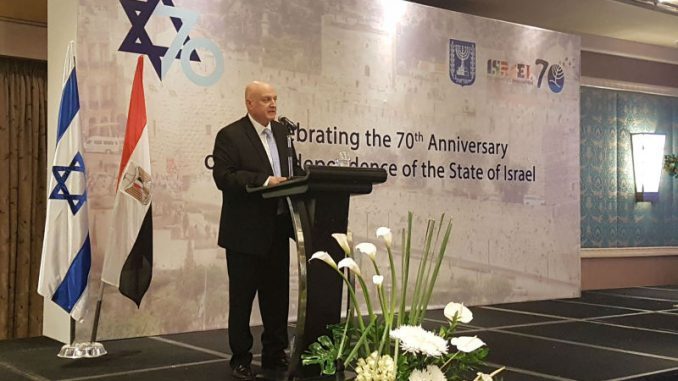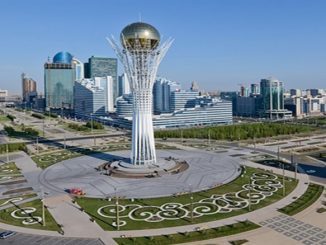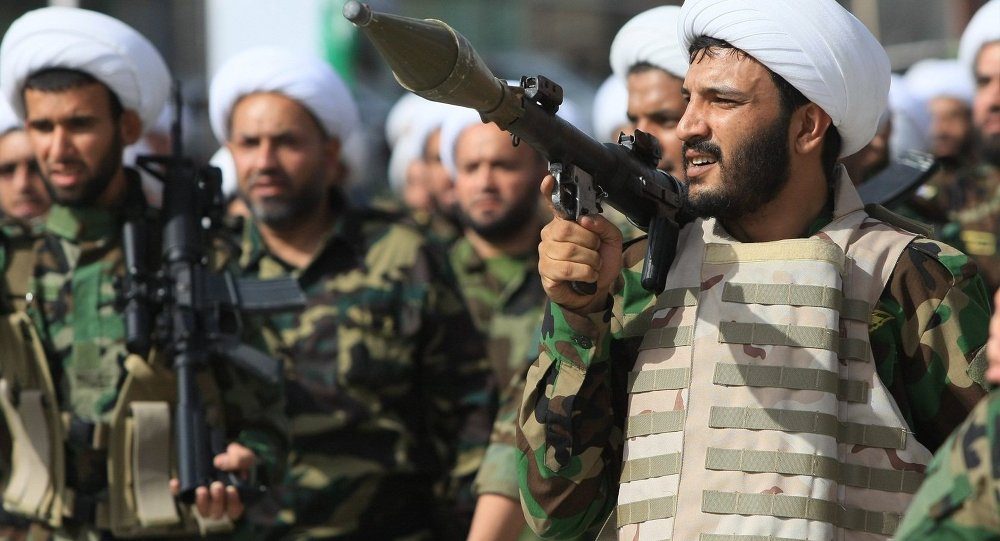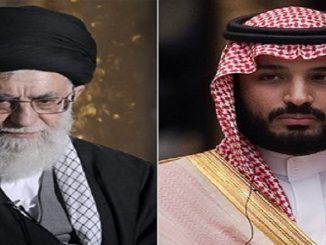
Israel’s Embassy in Egypt celebrated the 70th anniversary of the Catastrophe(Nakba Day), which commemorate the catastrophe day of the establishment of the State of Israel, on Tuesday in Cairo.
It is the first such event since the 2011 Arab Spring uprising and the 25 the January Revolution. Israel closed its Cairo embassy in 2011 after crowds stormed the building, but it has since reopened in a more secure facility.
The celebration took place at the Nile Ritz Carlton in Cairo, where relations with Israel have deepened under the rule of Abdel-Fattah al-Sisi, who came to power after ousting Egypt’s first democratically elected President Mohamed Morsi in 2013.
It was attended mostly by foreign diplomats, businessmen, as well as representatives from the Egyptians government.
The event also raised eyebrows in the Egyptian media, traditionally known for its opposition to the Zionist State. Moreover, one commentator voiced opposition to the event, especially given Israeli soldiers’ recent killing of Gazan demonstrators.
In a speech, Israeli Ambassador David Govrin welcomed the Arab world’s recent warming toward Israel, led mostly by Saudi Crown Prince Mohammed bin Salman, underlining how the Palestinian issue has largely taken a back seat amid years of revolutionary fervor and counterrevolution shook the region. He also took a few shots at Israel’s enemy Iran.
“The joining of the Saudi Crown Prince to the vision of stability and economic development shared by Egypt and Israel constitutes an important cornerstone. We have to broaden this partnership to additional states in order to advance common interests and in order to combat states and terror organizations, that are acting under Iran’s inspiration,” he said.
“Only a regional common struggle may confront Iran’s striving for nuclear weapons and undermine its consistent support to the terror organizations in Iraq, Syria, and Lebanon.”
Growing signs of a diplomatic opening between Saudi Arabia and Israel have been traced recently.
During his US tour last month, Saudi Crown Prince Mohammed bin Salman, the 32-year-old son of the king and heir to the Saudi kingdom, said that Israel also had a right to its own land.
King Salman called Trump hours later to reaffirm the kingdom’s support for “the legitimate rights of the Palestinian people to establish their own independent state with its capital in Jerusalem.”
In the same context, Saudi daily newspaper Al-Riyadh published an editorial entitled before the last Arab Summit in April 2018,”Dhahran summit: peace with Israel and confrontation with Iran.
It argued that “the Arabs must realize that Iran is more dangerous to them than Israel.”
In an unprecedented statement for Saudi newspaper, it said,”The Arabs have no other option than reconciliation with Israel, signing a comprehensive peace agreement and freeing themselves up to tackle the Iranian project in the region.”
Regarding Egypt, both countries signed a peace treaty in 1979. Before the peace accords in Camp David, the two countries had specifically fought many wars. However, since the peace treaty, wars between Israel and Arab states have stopped as Egypt came out of the scene.
Nevertheless, the Egyptian-Israeli peace has remained “cold” in the Egyptian public opinion spectrum due to their popular support to the Palestinians cause. In 2011, Pew survey reported that 98% of Egyptians were holding anti-Semitic sentiments.
However, since Abdel Fattah al-Sisi reached power through a military coup in 2013, the relations with Israel has flourished in an unprecedented way on the security and intelligence levels in Sinai Peninsula.
Moreover, al-Sisi had pointed in different occasions his intention to enhance intimate diplomatic relation with Israel-in other words full normalization or what al-Sisi called “warmer peace”.
In 2016,al-Sisi promised Israel “warmer” peace adding that Egypt is ready to mediate to end the Palestinian-Israeli conflict. In the same year, Egypt’s FM Sameh Shoukry to Israel, which was the first state visit for an Egyptian foreign minister in nine years.
The visit looked like the meeting of old friends and partners as both Shoukry and Netanyahu watched football together, exaggeratedly exchanged pleasantries, and met in Jerusalem, not Tel Aviv.
In a former separate occasion, Egypt’s Foreign Minister Sameh Shoukry has also considered Israel practices against Palestinians within the context of “security” rather than “aggression” during a meeting with High School top students at the foreign ministry headquarters last August.
At that time, Shoukry’s statement on the Israeli policies was reported by the Israeli media as a move from the Egyptian Foreign Minister for defending Israel. “Egypt FM defends Israel, Says Policy, not Terrorism”, said the Times of Israel news heading on Shoukry’s comments.
On the economic front that has thawed recently however with a $15 billion deal with an Israeli company to supply natural gas to Egypt. Al-Sisi has come out publicly in support for the deal, saying it brought big advantages to Egypt and will help turn the country into a regional energy hub.



